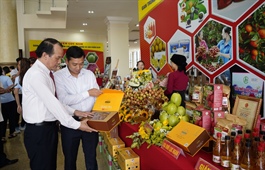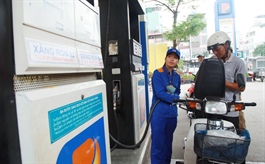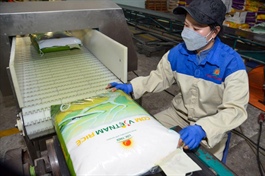Three EU countries warn against Vietnamese noodles over food safety problems
Three EU countries warn against Vietnamese noodles over food safety problems
Germany, Poland and Malta have released their warnings against two instant noodle products and one rice noodle product imported from Vietnam as they failed to meet the EU’s food safety requirements, with one of them containing ethylene oxide exceeding the bloc’s acceptable level.
The Vietnam Sanitary and Phytosanitary Notification Authority and Enquiry Point (Vietnam SPS), under the Ministry of Agriculture and Rural Development, provided the information to Tuoi Tre (Youth) newspaper on Friday.
The Vietnam SPS has recently received a notice from the European Union Rapid Alert System for Food and Feed (EU RASFF) about the problems, said Ngo Xuan Nam, deputy director of SPS Vietnam.
Specifically, Germany has issued warnings against instant noodles, including one with curry flavor and the other with chicken flavor, after detecting them contain ethylene oxide (EO) in excess of the EU’s acceptable level.
These products were made by Asia Food Joint Stock Company based in Vietnam’s southern Binh Duong Province.
Malta has released warning for rice noodles carrying the brand name Nguyen Gia and ordered recall of them from the market, claiming such products have been processed from unauthorized genetically modified rice.
Meanwhile, Poland has returned kid instant noodle products made by Ho Chi Minh City-based Vietnam Food Industries Joint Stock Company (Vifon) after releasing a warning about them for a hazard that has yet to be clarified.
Following the EU RASFF’s notice, the SPS Vietnam has coordinated with relevant agencies to clarify and trace the cause of the violation to take remedial measures, Nam said.
“We are also contacting Poland’s authorities concerned to clarify the reason why Vifon’s instant noodles exported to Poland were returned,” the official added.
Nam emphasized that the violation of the EU’s food safety regulations by Vietnamese enterprises will make it difficult for the efforts of SPS Vietnam and other agencies in reducing in the testing frequency for Vietnamese instant noodles imported into the EU.
Nam also said that the EU is currently applying a 20-percent inspection rate for Vietnamese instant noodles imported to the EU market.
This is not the first time that Vietnamese foods have been warned for containing excessive levels of EO, said the Science and Technology Department under the Ministry of Industry and Trade.
In August 2021, several Vietnamese instant noodles shipments were subject to warnings and recalls for containing EO by many European countries such as Switzerland, Norway, and the UK.
“Exporters should notice that each country has different food safety regulations, including those on EO acceptable levels,” Nam warned.
For example, the U.S. and Canada apply a maximum EO content of 7mg/kg for herbs, dried vegetables and bulbs, and sesame seeds, while the EU adopts a much lower rate, from 0.02 to 0.2 mg/kg, Nam elaborated.
Therefore, exporters must carefully study and comply with the regulations of each importing country, he advised.
The European Chemicals Agency (ECHA) classifies EO is as a mutagen, carcinogen and a reproductive toxicant, the Food Safety Authority of Ireland said.
Foods containing EO does not pose an acute risk to health but will cause increased health risk if consumed over a long period of time, so exposure to EO needs to be minimized, the agency warned.




























